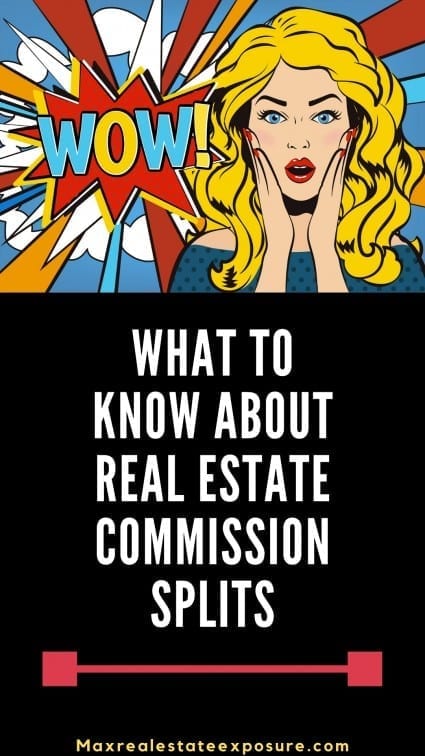What Do Real Estate Agents Charge For Commission?
 One of the most asked questions in real estate is, “how much is the real estate commission”? You should know from the get-go that commission on real estate is entirely negotiable.
One of the most asked questions in real estate is, “how much is the real estate commission”? You should know from the get-go that commission on real estate is entirely negotiable.
Nothing anywhere says a commission needs to be a certain amount of money. Real Estate agent fees are variable.
What one real estate company charges for a real estate commission might be completely different than another firm down the street.
In some real estate franchises like RE/MAX, the real estate agent may be wholly empowered to decide what they will charge for a commission.
The brokerage firm will determine what the real estate agents charge in most real estate franchises.
When a situation arises where a commission is asked to be reduced, the agent will usually need to ask for permission from the owner or broker.
Experienced and reputable real estate agents make the home buying and selling process much more comfortable, efficient, and productive for clients.
Of course, Realtors® need to be paid for their services, typically paying them a commission from the home sale. Some people feel like real estate agents are paid too much, while others think that Realtors® do not make enough for their hard work.
A small percentage of consumers choose to sell for sale by owner without a Realtor in the hopes they will save money by not paying a real estate commission.
The Realtor fees that real estate agents charge depend on your area, the current real estate market, and the type of home you are selling.
While it is impossible to list the typical real estate commission in your area, we can give a general overview of how commissions work in a real estate transaction.
Let’s dive into how much real estate commission you will likely be paying when selling a house.
Real Estate Commissions – What You Need to Know
Let’s look how at how real estate commissions work.
Usually, The Seller Pays The Agent Fees.
The seller pays the real estate agent’s commission in most real estate transactions. The seller paying makes a lot of sense because the home sale will produce a big payout for the seller, and the seller’s agent has to do a lot of work to make that sale happen.
The real estate agent commission can vary and is negotiable but often sits somewhere between 4 percent to 7 percent.
Depending on where you’re located, the most probable commission you’ll pay to sell your home is 5 to 6 percent of the home’s sales price. The average real estate commission will fall between these two figures, at 5.5%.
Since the seller is paying, they must do their due diligence before hiring a real estate agent. If you are selling a home, you need to interview multiple real estate agents to find one that fits your specific needs and has a personality you can work with and feel comfortable with.
Once you hire a real estate agent, they will sell the home and ensure you get the best possible deal from the transaction. Typically, real estate agents do not get paid until the home sells.
Example Commission on Selling a House
Let’s look at what a seller would pay to sell their home using an average real estate agent commission.
The home’s sales price is $500,000, and the commission rate is 5%. Under this example, a seller would pay $25,000 in real estate commission.
The commission paid is based on the final sales price of the home. There is often a misconception about how much a real estate agent makes on a transaction.
There is No Set Commission on Real Estate
As mentioned already, Realtor’s fees are one hundred percent negotiable between a real estate agency and its client. While typical rates may arise in a particular area, there is no set commission rate, Realtor fee, or standard percentage.
Some people may wonder why that is the case, and it boils down to what’s known as the Sherman Antitrust Act. The act was implemented to prohibit businesses from getting together and barring competition.
Real Estate commission fees should not be fixed.
In essence, all the real estate agencies in a given area cannot get together and agree to set commission rates. Doing so would amount to collusion and setting real estate commission income. However, that does not mean a real estate brokerage cannot mandate that their agents charge a specific rate when listing a home for sale. Doing so is legal and at the discretion of the real estate agency.
In 1979 a lawsuit, United States v. P Foley, tied up real estate agent commissions with antitrust law. The case put real estate agent fees under a microscope and changed how real estate brokers conduct themselves related to clients’ compensation.
Due to the Sherman Antitrust Act, agents need to be careful about what they say about how much they charge for commission.
For example, a real estate agent should not say real estate fees in my town are X percent. Realtors’ commission rates should not be discussed among agents.
Seller’s Agents Will Often Split The Commission With a Buyer’s Agent.
 Remember that the seller’s agent will often share the commission with another agent – like when another Realtor® finds a buyer for the property.
Remember that the seller’s agent will often share the commission with another agent – like when another Realtor® finds a buyer for the property.
So how is the commission divided between agents?
The listing broker usually splits the commission with the buyer’s agent fifty-fifty.
However, sometimes, a commission split between the listing agent and the buyer’s agent could be different. In most situations, it is a mistake to discount the buyer’s agent commission when you sell a home.
Home Buyers Can Pay Real Estate Commission Fees Too
One of the popular questions consumers ask is who pays real estate commissions. It’s not just the seller who pays Realtor fees.
It is also possible that a buyer’s agent could be paid directly by the potential buyers. There are a few common circumstances where prospective buyers could pay their buyer’s agent.
For example, if a buyer’s broker locates a home for their client for sale by owner. The FSBO may not be willing to pay a buyer’s agent. In this circumstance, the buyer pays their agent an agreed-upon commission.
Sometimes a buyer’s agent will have a buyer’s agency agreement that says they will get paid a minimum amount of Realtor fees. The buyer will make up the difference if the seller offers a lower commission rate than this amount.
When you sell a house, it is an intelligent move not to discount the commission that the buyer agent will be paid. Doing so could make your home harder to sell and net you less money, not more.
Sometimes Real Estate Commissions Get Discounted
One of the more popular questions from sellers to real estate agents is whether there will be a discount if the listing agent procures the buyer themselves.
Real estate agents are often willing to offer reduced commission rates if they have both the buying and selling sides of the transaction.
Another instance where Realtors are typically willing to discount the commission is when they work with clients buying and selling a home through them. You just need to ask! If an agent thinks clearly, they will agree with your request.
Good agents will often comply with this request instead of keeping the entire commission. Commission on real estate should not be set in stone. Agents that think this way are shortsighted. Giving back part of the commission is usually a good business move.
Be Leery Real Estate Agent Commission Gimmicks
Consumers need to be leery of real estate agents who sucker you into circumstances that benefit them, not you. Here are a few examples of ways home sellers get duped:
- Pocket listings or in-house sales – a pocket listing is when you let your real estate agent market your home without letting everyone else know it’s for sale. The agent hopes they are the one who procures a buyer and gets an in-house sale making a double commission. You should have maximum exposure to ALL buyers to get the most money for your home.
- Coming soon listings – coming soon real estate marketing is similar to pocket listings because the listing agent has an opportunity to sell the house themselves. The property is not being opened up to all buyers. One of your goals should be a bidding war when selling a home.
- Guaranteed home sale – The guaranteed home sale is a gimmick that has been around for many years. Real Estate agents use it to sucker naive sellers by telling them they will purchase the house if it doesn’t sell. Yippee – they will buy your home for fifty cents on the dollar. Do yourself a favor and hire a winner. Not a real estate agent that uses these kinds of marketing tactics.
- Dual agency – discussed below in detail—is something every seller should avoid. There are no benefits to a seller. The only winner is the real estate agent. Agents often exaggerate the benefits of open houses to increase the odds of dual agency occurring.
What Are Flat Fee Entry-Only Agents
It is worth noting that another type of commission arrangement that has popped up over the last decade is what’s known as entry-only flat fee commission. A broker will list a property for a flat fee in this arrangement and do nothing more than put it in the multiple listing service.
While the typical real estate agent commission is based on a percentage of the home’s sale price, a flat fee brokerage charges a set fee.
Flat fee commissions are a compromise for someone selling their property for sale by owner. They don’t pay the typical Realtor’s fees. The seller’s commission ends up being less.
The FSBO gets to sell their property on their own and has the privilege of placing their home in the MLS. In this scenario, the seller does all of the work. The real estate agent does none of the traditional marketing activities. The seller also has no representation.
There are some significant pros and cons to marketing a home in this fashion. Make sure you read the article referenced here to understand the downsides. There is a good reason why most consumers choose full service over flat fees.
Usually, a house sells with a full-time real estate professional for top dollar. Lower commission rates do not necessarily translate into more money in a seller’s pocket.
For sale by owners fail a high percentage of the time because they forget about the vast amount of things a full-service agent does behind the scenes.
Flat fee entry only listings have not really caught on because there is much more to selling a home than putting it in MLS.Click To TweetDifferent Realtors® Get Paid in Different Ways.
 There are a variety of arrangements real estate agents make with each other and with real estate businesses. Most real estate agents are independent contractors who subsist solely on their commissions.
There are a variety of arrangements real estate agents make with each other and with real estate businesses. Most real estate agents are independent contractors who subsist solely on their commissions.
When an agent works for a brokerage, the brokerage’s policy will dictate how the agent’s pay is calculated. The real estate agent commission split with the broker can vary tremendously.
How much real estate agents make will depend on how they get paid.
According to the National Association of Realtors®, some of the ways that real estate professionals are paid include the following:
- They have a graduated commission split. Twenty-three percent of real estate agents do not have a set commission rate but are paid more when producing more sales for the brokerage. New agents often work on this type of fee schedule.
- They have a fixed commission split. Thirty-six percent of real estate agents have a fixed commission split with the brokerage they work with. For example, if the agent has a 70/30 split with the brokerage, the agent gets 70 percent of the commission, and the brokerage receives 30 percent.
- Full commission. Thirteen percent of real estate agents get 100 percent of their commissions. These agents usually have to pay a broker a desk fee or a transaction fee ranging from $200 for each transaction to $2,000 a month.
- They have a capped commission split. Sixteen percent of real estate agents will split their commissions with a brokerage until they reach a specific threshold, then get the full commission once they hit that threshold.
- Other compensation structures. Twelve percent of real estate agents participate in different types of commission structures, such as getting a salary and a share of the profits, a salary and a production bonus, or a commission plus a cut of the brokerage profits.
- Salary only. Just one percent of real estate agents work for just a salary. Although this is rare, it is seen in unique situations like with brokerages that charge a small commission – sometimes as little as 3 percent – and require a minimum fee to cover all expenses of preparing a home.
As you can see, how a real estate agent is paid can vary quite a bit.
Average Yearly Realtor® Commission
Do you know the average Realtor commission? Many people think they know how much real estate agents make in commission for some odd reason. Most people think that real estate agents make money hand over fist.
The national average for real estate agent commission is, in fact, not what you think.
While top agents make an excellent income, average agents do not. In fact, the average income is lousy!
According to The National Association of Realtors, in 2020, the average yearly commission was $43,330. Real Estate agent commission was down from the year before, which was $49,700. So the average commission was not very good for making a great living.
Income was generally in line with experience. REALTORS® with sixteen years or more experience had a median gross income of $71,000, while REALTORS® with two years or less experience had a median gross income of $9,300.
It is essential to note that unlike most businesses with an 80/20 rule, whereby 80 percent of the business is done by 20 percent of their members, it is 93/7 in real estate. Yes, you read that correctly – 93 percent of all real estate transactions are done by 7 percent of the agents.
The other thing that should be understood is that real estate commissions are usually split in four ways. The listing firm, the listing agent, the selling firm, and the selling agent typically split the commissions.
Consumers should also understand that there is a difference between a Realtor® and a real estate agent.
The Commission, a Real Estate Agent Charges, Will Vary Depending on Their Role
 Determining what a real estate agent does and who they work for can be confusing if you just go off of terms and titles – for instance, sometimes, the buyer’s agent can be called the selling agent.
Determining what a real estate agent does and who they work for can be confusing if you just go off of terms and titles – for instance, sometimes, the buyer’s agent can be called the selling agent.
The listing agent is the term used for the agent working for the seller.
To ensure you know what you are getting into, ask the agent to clarify who they work for and what they charge upfront.
As a seller, you want an agent working on getting you the highest possible sales price – or a combination of a higher price and other desirable terms, such as selling quickly to move to the closing and buy another home.
As a buyer, you want an agent who will work to get you the best possible deal on the house you want.
Avoid Dual Agency Even With a Commission Reduction
There is something in real estate called “dual agency” that you want to ensure you are not getting dragged into without your knowledge. Dual agency means that the agent works for the seller and the buyer.
Working for both parties is impossible if you think about it – not if you are committed to getting the best result for the client.
While some states have made dual agency illegal, others still allow it or allow it as long as it is disclosed to the clients. Whether it is revealed or not, you are better off with an agent committed to your best interests.
Many agents will fool a seller into accepting dual agency by offering them a carrot of reducing the commission.
Sellers should understand that their agent DOES NOT have to become a dual agent – a circumstance in which the agent will no longer be representing them. They can remain as a seller’s agent and still give the seller a commission discount.
Avoid dual agency arrangements; as a rule, they do nothing for a seller. Dual agency is illegal in eight states, including Alaska, Colorado, Florida, Kansas, Maryland, Oklahoma, Texas, and Vermont.
Don’t be suckered into this awful arrangement. A commission for a real estate agent is often the driving force for poor business decisions.
How Does a Real Estate Agent Commission Bonus Work?
Typically, when the housing market favors buyers, some sellers may offer what’s known as an agent real estate commission bonus to get their home sold. Years ago, before the advent of buyer’s agency, doing so made more sense.
The agent bonus was used to incentivize agents to sell their property. With the arrival of buyer’s agency, it makes a lot less sense. An agent commission bonus is pandering to an unethical agent. Why? If you are a buyer’s agent, the offered commission should not affect whether an agent shows a client a specific property or gives you great advice.
Think of it this way – if a buyer’s agent gets the seller (who they do not represent) the terms they want from their buyers (who they represent), they get a nice bonus. This works well if you have no integrity!
Realtors® Do A Lot For The Money
 A first look at an agent’s fee can present sticker shock. After all, it is your house you are selling, and you want to get as much from that sale as possible.
A first look at an agent’s fee can present sticker shock. After all, it is your house you are selling, and you want to get as much from that sale as possible.
In reality, though, real estate agents tend to make less than you think after all the splits and agent fees are calculated.
The money you pay for an excellent real estate agent is an investment. The agent is motivated to sell your home for a great price because that means more income. Many people wonder what a real estate agent does all day. It is a lot more than you think.
Here is a quick summary of what a real estate agent does to earn their real estate commission.
What Does a Real Estate Commission Cover?
- Help you set a competitive list price by performing a comparative market analysis and analyzing current market conditions.
- Ensure that you get great photos to attract buyers.
- Write a listing copy that will draw in the people you want to look at your home.
- Help you stage the house to make it look the best. Provide guidance on junk removal and other decluttering tips.
- Show the home repeatedly to encourage offers and get your home under contract as soon as possible.
- Putting your listing up on all applicable marketing channels.
- Helping you negotiate the best deal when you are fielding offers from buyers.
- Help negotiate any home inspection issues.
- Set up sellers with a real estate attorney if needed.
- Attend the real estate appraisal and provide appropriate real estate comps to the appraiser.
- An outstanding agent can often influence the home’s sales price through their efforts.
- Continue to provide counseling until closing, including recommendations for moving companies and other needed vendors.
Do You Have to Pay a Realtor® if Your Home Does Not Sell?
More often than not, the answer is no. Real Estate is a performance-based business. Commissions on real estate are usually only paid when the job is done.
The typical real estate contract states that a real estate agent will only get paid if and when the property closes. Some contracts state that you will owe the agency a real estate commission if a buyer is successfully procured and backs out of the contract.
Looking over the fine print and knowing precisely what you agree to when signing an exclusive right-to-sell listing agreement is essential.
There are numerous occasions when sellers want to fire their real estate agent for lack of performance. Getting out of a contract is not as easy as you think.
The same can be said if you hire a buyer’s agent and sign a buyer’s agency agreement.
When Does Real Estate Commission Get Paid?
Real Estate commissions are paid at the closing. The fees come from the seller’s proceeds and are shown on the HUD Settlement Statement.
The commission check will be given to the listing agent at the closing table. The listing brokerage will pay any balance of the commission owed to the co-broke if there is one.
FAQ’s on Real Estate Commissions
The following are some of the most asked questions about Realtor’s fees.
1. How do Real Estate agents get paid?
As you have learned, real estate agents get paid by receiving a commission based on the sales price. Real Estate agents do not get paid hourly.
2. How much do real estate agents make?
A real estate agent’s income will depend on how many sales they make in a given year, along with the total of their expenses.
3. What commission percentage do most Realtors charge?
The country’s most common real estate commission is 6 percent of the sales price. Realtor commissions are calculated by multiplying the sales price by the agreed-upon commission percentage. In most parts of the country, a fair commission is somewhere between 5 and 6 percent of the home’s sales price.
4. What is the commission split in real estate sales?
The most common commission split on real estate is by far 50/50. If you deviate from that, it will be looked upon unfavorably in many places.
5. How do I ask a Realtor to lower their commission?
One of the best ways to lower agent fees is when you will buy and sell simultaneously. If you ask the agent to discount their commission if buying and selling with you, they will often agree to a commission reduction.
Frankly, if an agent disagrees, you would be better off hiring someone else.
6. Are commissions on real estate negotiable?
Yes. Real Estate commission rates are negotiable. Some agents, however, may not budge from what they charge for a fee. The Realtor commission rate can vary from agent to agent and company to company. It is a good idea to interview multiple real estate agents.
7. What other fees do I have besides a real estate commission when selling my home?
You can see a seller’s closing costs in this home-selling expenses guide.
8. What does a 70/30 commission split mean?
Commissions on real estate are split between a real estate agent and the company’s owner. The agent gets 70 percent of the total commission in this scenario, and the real estate broker gets 30 percent.
The commissions split between agents and brokers will vary from company to company.
Final Thoughts For Commissions on Real Estate
Whether buying or selling a home, it is vital to vet the real estate agent you hire. If an agent does an exceptional job, the commission you pay will be worth it.
You will likely feel the opposite if you get stuck with a lousy agent. How much a real estate agent charges for a commission is essential but should not be the only factor in hiring decisions.
As you have learned, the real estate agent commission is not their take-home pay. The average real estate agent commission is significantly less than most people think.
Hopefully, you have found this guide on commissions for real estate to be helpful.
About the author: The above Real Estate information on how much are real estate agent commissions was provided by Bill Gassett, a Nationally recognized leader in his field. Bill can be reached via email at billgassett@remaxexec.com or by phone at 508-625-0191. Bill has helped people move in and out of many Metrowest towns for 36+ years.
Are you thinking of selling your home? I am passionate about real estate and love sharing my marketing expertise!
I service Real Estate Sales in the following Metrowest MA towns: Ashland, Bellingham, Douglas, Framingham, Franklin, Grafton, Holliston, Hopkinton, Hopedale, Medway, Mendon, Milford, Millbury, Millville, Natick, Northborough, Northbridge, Shrewsbury, Southborough, Sutton, Wayland, Westborough, Whitinsville, Worcester, Upton, and Uxbridge MA.


Many sellers often get too focused on the commission as opposed to their net proceeds. I’ve seen many sellers leave lots of money on the table by using a discount agent or MLS only listing with poor pictures, bad marketing, and inexperienced negotiators.
So true Gabe. Some sellers have no idea what they give up when using entry only agents. Discounting the commission almost always results in a lower net as well.